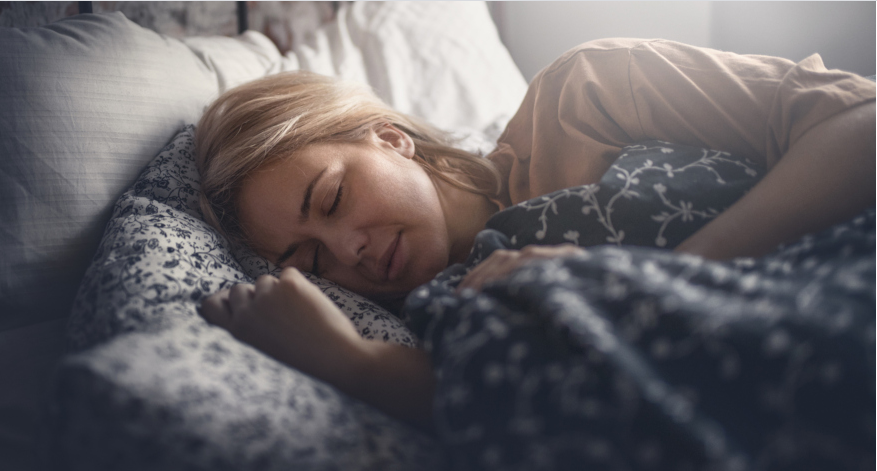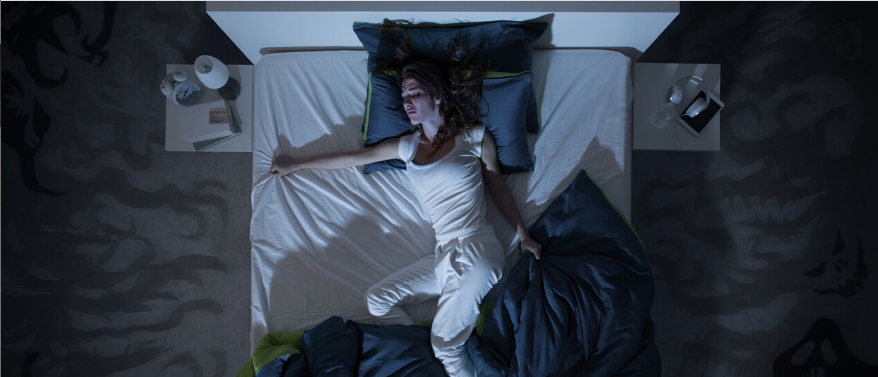Regeneration, detoxification, learning: While you sleep, a whole series of important, sometimes even vital, processes happen. In this article, we will shed light on the role of deep sleep in this process. Click in and learn why you should improve your deep sleep.
Despite decades of research, the secrets of sleep, its sleep phases, and their functions are still not fully understood. What research knows: sleep is vital for you, among other things because your brain is freed from waste products during sleep.
Characteristic of healthy sleep is the sequence of different sleep phases. Deep sleep is the fourth sleep phase and is particularly deep compared to the others. This means that your pulse, breathing rate, muscle tension, and blood pressure are lower than in any other sleep phase. The relaxation is highest here.
Let's take a closer look at this sleeping phase!
Table of contents
- What is deep sleep?
- When are you in deep sleep?
- What happens in the deep sleep phase?
- Our sleep phases at a glance
- How do your sleep stages go?
- Deep sleep duration in hours: How long does deep sleep last?
- How much deep sleep does a person need?
- What happens if there is not enough deep sleep?
- How can you improve your deep sleep?
- Conclusion
- Sources
1. What is deep sleep?
Deep sleep is the sleep phase of human sleep, which is particularly deep. This means that all characteristics of the waking state are particularly weak here.
These include vegetative characteristics such as breath, pulse, and blood pressure as well as muscle tone (muscle tension) and sensory perceptions. Your body is maximally relaxed in deep sleep. You are completely introverted and hardly notice your surroundings.
Waking you up is particularly difficult in the deep sleep phase. However, if you wake up directly from a deep sleep, you will need comparatively much time to orientate yourself. Phenomena such as sleepwalking or sleep talking take place exclusively in deep sleep.
2. When are you in deep sleep?
In research, the term "deep sleep" is used to describe two stages of deep sleep. They are the third and fourth stages of a total of five sleep stages.
During sleep, the individual sleep phases alternate in regular cycles. This means that you are not in deep sleep once, but several times - always alternating between light sleep phases and the dreamy REM phase. In terms of total sleep, you are in deep sleep for about a quarter of the night.
Sleep cycle has a duration of about 90 minutes in a healthy adult over 30 years of age. The longer you sleep, the shorter the deep sleep phase, while the REM phase is longer.
BRAINEFFECT HACK : It takes you forever to fall asleep at night? Then our SLEEP SPRAY with melatonin to shorten your sleep time in the future.
3. What happens in the deep sleep phase?
In the deep sleep phase, many different regeneration processes take place. You are maximally relaxed, ie your muscles are not tense, your pulse and breathing run at the lowest frequency and the nerve activity in the brain also decreases.
The most important processes that take place in deep sleep, here is an overview:
- Healing wounds and injuries
- The immune system is strengthened
- Growth hormones are released
- Experiences are processed [1]
- Memories and lessons learned are consolidated [2]
- Subconscious decisions are made
4. Our sleep phases at a glance
The deep sleep phase is one of five sleep phases [3]. While you sleep, these alternate again and again. This means that you sleep sometimes deeper, sometimes less deep. After about six to eight hours, the sleep phases alternate in ever shorter intervals until you finally wake up.
These are the five sleep phases:
- Fall asleep or light sleep
- Medium-light to light sleep
- Transition phase to deep sleep
- Deep sleep
- REM sleep
What happens during the sleep phase?
In preparation for the night's rest, you relax and come to rest. Sleep rituals help you to quickly find your way to sleep. When you close your eyes, your organism immediately begins to decelerate all processes.
The activity of the nerve cells slows down and your muscles relax. You perceive your surroundings less and less - you hear and feel less and less - and slowly slide into sleep.
BRAINEFFECT HACK : You want to effectively shorten your time to sleep? Then our SLEEP SPRAY with melatonin just right for you.
When does the light sleep phase occur?
The light sleep phase can hardly be distinguished from the fall asleep phase. Your perception and the muscle tension in your whole body are still reduced to a minimum. But it is relatively easy to wake up in this phase. Light sleep phases occur again and again and makeup about half of your total sleep.
Recovery: What happens in the deep sleep phase
You can benefit from all the positive effects of sleep especially during deep sleep. It gives you relaxation and regeneration. This means that your body processes what it has experienced the day before, stores important information in its memory, and consolidates learning content.
Likewise, your body prepares for the new day by building up new strength. A healthy deep sleep ensures that you are powerful every day and are well prepared for the challenges of work and sport.

The relationship between deep sleep and light sleep
While you sleep, light sleep and deep sleep phases alternate again and again. In these repeated cycles, you slide down into deep sleep several times. Before you wake up, you are usually in a light sleep phase.
The dream stage: When do we have REM phases?
You can imagine the REM phase as the complete opposite of the deep sleep phase: This phase is characterized by high brain activity, elevated blood pressure, fast heartbeat, and rapid breathing. Twitching arms and legs and eye rolls are also typical.
The REM phase is often referred to as the dream phase. You probably dream during every sleep phase, but the dreams of the REM phase are the ones you remember best and most vividly.
A healthy adult is in the REM phase for about 1.5 hours when sleeping for six to eight hours.
{{widget type="egproducts/list_productbyid2" product_id="185" img_width="250" img_height="335" template="elegento/products/productteaser_by_id_2.phtml"}}
5. How do your sleep stages go?
As already mentioned, your sleep phases are organized in so-called sleep cycles [4]. In such a cycle, all five phases run one after the other and are repeated with each new cycle. This means that you are always in the light sleep, deep sleep, and REM phase.
However, while the duration of a sleep cycle always remains approximately the same - it is about 90 minutes - the proportion of the individual sleep phases changes. You are in deep sleep for a shorter and shorter period of time and in the REM phase for a longer and longer time. Since the REM phase is longest before you wake up, you will probably remember your dreams particularly well.
6. Deep sleep duration in hours: How long does deep sleep last?
The question of how many hours of deep sleep one should have in order to feel rested cannot be answered unequivocally. In a healthy adult, the proportion of deep sleep is about 15 to 25 percent. This results in deep sleep duration of 1.5 to two hours. The prerequisite, however, is that the total sleep lasts at least six hours.
How much deep sleep do you need? About 1.5 to two hours
What percentage of deep sleep is normal? 15 to 25 percent
If you sleep regularly for only four to five hours, you will only be in deep sleep for a very short time and will recover less well in your sleep. You feel exhausted and tired.
BRAINEFFECT HACK : You want to get to sleep faster? Then our SLEEP SPRAY with melatonin to shorten your sleep time.
{{widget type="egproducts/list_productbyid2" product_id="154" img_width="250" img_height="335" template="elegento/products/productteaser_by_id_2.phtml"}}
7. How much deep sleep does a person need?
Measured by the common and healthy sleep duration of six to eight hours, humans need deep sleep of about 1.5 to two hours to be powerful.
How much deep sleep per night is normal?
Sleep research concludes that adults with a healthy sleep spend about 15 to 25 percent of their nights in deep sleep. With a total sleep length of six to eight hours, this means a deep sleep duration of 1.5 to two hours. This is how much deep sleep is necessary to feel fit and rested.
How do you know how much deep sleep you have?
You cannot distinguish between the different sleep phases while you sleep. Even from the outside, it is difficult to determine when someone is in deep sleep. Sleep researchers use an EEG (electroencephalography) to identify the stages of sleep, measuring the electrical waves in the brain of sleepers.
Scientists can determine the sleep phase based on the rhythm and intensity of the brain waves. So-called delta waves characterize deep sleep. These are particularly slow waves with high amplitudes. Of course, you cannot see them from the outside.
Rapid eye movements and twitching of arms and legs indicate that you are in the REM phase. Shortly before that, you were in the deep sleep phase. Even if you talk in your sleep, you are most likely in deep sleep. But only someone else can tell you that.
Awakened during the deep sleep phase: How our body reacts
It is extremely rare and unlikely that you will wake up directly from a deep sleep. Your body is so relaxed that it perceives its surroundings minimally or not at all. You are certainly familiar with the phenomenon of people oversleeping New Year's Eve: Even the loud crack of the firecrackers does not penetrate your consciousness when you are in deep sleep.
However, if you are awakened from a deep sleep, you will feel extremely sleepy and tired. You sometimes find it difficult to orientate yourself and it takes you a comparatively long time to be able to speak and move.

8. What happens if there is not enough deep sleep?
Lack of sleep, especially the lack of deep sleep, can cause you to be mentally and physically less capable. People who are constantly tired can concentrate less well, are agitated and irritable. A tired body can also perform less in sports than when it is rested and rested. A permanent lack of sleep can even have serious consequences.
What is the cause of too little deep sleep?
Only very short or no deep sleep occurs when the total duration of your sleep is too short or you are too excited to fall into a restful deep sleep due to worries or stress. Try to allow yourself enough time to sleep even in stressful phases. At least six hours of sleep are recommended. Relaxation exercises such as yoga or autogenic training can help you to find peace and get you in the right mood for the night's rest.
What disturbs deep sleep?
Unwanted stimulants lurk in many places in everyday life: In the evening, a trip to the fitness center, a Netflix marathon, or a big dinner menu can rob you of sleep and ensure that you don't experience deep sleep.
When you are already in deep sleep, often only a few things disturb him. However, noise, brightness, freezing, and sweating can wake you up. To avoid this, you should create a comfortable, pleasant environment in your bedroom and remove all sources of disturbance.
9. How can you improve your deep sleep?
There are many tactics to prolong your deep sleep. The first step is to identify and eliminate the disturbing factors that prevent you from a healthy deep sleep. Take a close look at your everyday life and try to identify bad habits.
Look around your bedroom, too: What couldn't let you sleep at night? It is also worth establishing a calming evening routine. Meditation, reading, or a short walk can work wonders.
Acute difficulties in falling asleep can be solved by using preparations containing melatonin.
BRAINEFFECT HACK : Our SLEEP SPRAY helps you shorten your sleep time thanks to melatonin.
So important is correct sleep hygiene
With the right sleep hygiene, you can improve your sleep and even cure problems falling asleep.
Doctors and scientists define sleep hygiene as behavior that promotes healthy, restful sleep and thus prevents sleep deprivation and fatigue. The German Society for Sleep Research and Sleep Medicine (DGSM) has published a handbook with the most important rules for sleep hygiene.
Among other things, they recommend avoiding alcohol and caffeinated drinks just before going to bed. Instead, regular sport and relaxation exercises should improve sleep hygiene.
10. Conclusion
Deep sleep is one of five sleep phases. Your organism is maximally relaxed during deep sleep. In addition, important memory and regeneration processes take place. To get enough deep sleep, you should allow yourself a total sleep period of six to eight hours at night.
11. Sources
[1] Born, J., Rasch, J., Gais, S. (2006) Neuroscientist. Sleep to remember. Vol. 12, Issue 5, p. 410-424 [ https://journals.sagepub.com/doi/abs/10.1177/1073858406292647 ]
[2] Paschek, N. (2015) Spectrum of Science: Learning While We Sleep. [ https://www.spektrum.de/news/lernen-im-schlaf/573062 ]
[3] Sleep stages and sleep architecture. In: Sleep Training – A Therapy Manual for the Treatment of Sleep Disorders. Hogrefe-Verlag, 1999. Excerpts at [ https://www.schlafgestoert.de/site-51.htm l ]
[4] Weeß, H.-G. (2009) Psychotherapy in Dialogue: Phenomenology, Function, and Physiology of Sleep. Vol. 10, Issue 2, pp. 101-106 [ https://www.researchgate.net/publication/247467289_Phanomenologie_Funktion_und_Physiologie_des_Schlafes ]
[5] Crönlein, T. and Weeß, H.-G. (2011) Patient guide of the German Society for Sleep Research and Sleep Medicine (DGSM) [ https://www.dgsm.de/patienteninformationen_ratgeber.php ]















